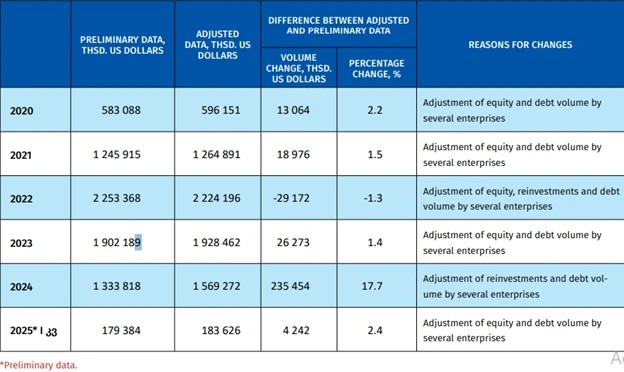GBC Interview with Shorena Kopaleishvili - IT Sector Prospects
The export of IT technologies in Georgia has reached a record level,
exceeding 2 billion lari. Experts consider tax incentives, enjoyed by
companies with the "Virtual Zone Resident" status, as the primary
factor driving the industry’s growth. Despite rising trends in the
sector, challenges remain, the overcoming of which could accelerate
its development in the country. Shorena Kopaleishvili, Chairperson of
the Association of Georgian Virtual Zone Persons, discusses the
current state of the IT sector, trends, and challenges.What has been
the dynamics of IT technology exports in Georgia in recent years?–
The export of IT services from Georgia has grown significantly in
recent years. A particularly notable increase began in 2022. Looking
at the dynamics of the last few years, it’s worth noting that export
revenues quadrupled between 2021 and 2023, reaching 892 million USD in
2023, with a total turnover of 5.1 billion lari. Thanks to this rapid
growth, the ICT sector took eighth place among the largest economic
industries in 2023. However, in 2024, the income of Georgia’s IT
sector decreased by approximately 12% compared to the previous year.
This was due to objective reasons, as nearly all business sectors
faced various challenges in 2024. Nevertheless, the first quarter
results of 2025 exceeded all expectations: during this period, the
sector’s external revenue reached 266 million USD, a 70%
increase—or 110 million USD more—than the previous year. The
primary market for Georgia’s IT service exports remains the United
States of America.In your opinion, what has contributed to such growth
in the sector?– The growth and development of the sector were
initially supported by tax incentives. Since 2022, the growth rate
accelerated due to the relocation of international companies and IT
specialists to Georgia, prompted by the Russia-Ukraine war. Additional
incentives include affordable internet costs, relatively low living
expenses compared to other attractive locations, and the country’s
favorable geographical position. Moreover, local companies are
actively adapting to global trends, further enhancing Georgia’s
investment appeal.In my view, tax incentives remain the key factor in
the attractiveness of IT business in Georgia. Specifically, when
considering the context of benefits for virtual zone companies. The
"Virtual Zone Resident" status offers unique opportunities for IT
companies operating on Georgian territory. This status provides
significant tax advantages, fostering both the development of existing
companies and the establishment of new businesses in the technological
sector. Virtual zone residents are fully exempt from profit tax on
income derived from IT services provided abroad. This benefit is
particularly crucial for fast-growing tech companies, allowing them to
direct all profits toward development and expansion. Exemption from
value-added tax (VAT) is another significant advantage. Companies do
not have to pay the 18% VAT on services provided to foreign clients,
enabling them to offer more competitive prices on the international
market.How many international IT companies are registered in Georgia
today, and what has been the dynamics of their numbers in recent
years?– As of July 1, 2025, 38,525 entities are registered in the
information and communication technology sector, of which 24,265 are
active. The number of medium and large companies is around 200, with
the rest primarily consisting of foreign individual entrepreneurs, a
trend linked to migration effects. The share of IT companies of
foreign origin in this statistic is significantly higher than that of
local companies, accounting for approximately 80%.Interest in
conducting business in Georgia in this field continues to grow. The
interest in the virtual zone status also remains strong. Between
January and July 2025 alone, this status was granted to 28 legal
entities, which is a positive and encouraging trend for the sector.Do
challenges remain for international IT companies in Georgia, and if
so, what problems do tech companies face?– Despite rapid growth and
positive trends, IT companies operating in Georgia encounter various
structural and operational challenges. In my opinion, several key
factors can be highlighted:1. Deficit of Qualified PersonnelThere is a
noticeable shortage of mid- and high-level specialists on the market,
particularly in areas such as software engineering, cybersecurity, and
DevOps.A trend of "talent drain" is observed: a portion of highly
qualified professionals opts for careers and high-paying positions
abroad.Most specialists live and work in urban centers, confirming
that, despite the potential for remote work, the sector remains highly
centralized.2. Limited Local Market SizeLocal demand for IT products
and services is limited, increasing companies’ dependence on
external markets.3. Challenges in the Education SystemEducational
programs at universities and vocational institutions do not always
meet the real needs of the market. The imbalance between formal
education and the private sector’s requirements significantly
reduces the quality of professional training.4. Technological
InfrastructureAlthough internet infrastructure in Georgia is actively
developing, regional coverage and reliability issues persist.5.
Regulatory and Legal EnvironmentForeign investors and companies note
that Georgian legislation is insufficiently predictable and stable,
especially in the area of tax regulations.6. Political and
Geopolitical FactorsRegional security challenges and the risk of
political instability encourage investors to exercise greater
caution.7. Competition on the Global MarketGeorgia’s IT sector must
compete with strong regional and international hubs such as Ukraine,
Poland, and the Baltic states, where the workforce is represented on a
larger scale.What prospects do you see for this sector despite the
challenges? Will it continue to grow in the coming years?– The
outlook is promising. Georgia’s IT sector is at a pivotal stage of
development. The growing potential of its workforce, close
collaboration with international partners, and the trend toward
integration into global markets create a solid foundation for the
country’s technological progress. With the right state policies,
education reforms, and strengthening of business infrastructure, the
sector can not only solidify its position in the region but also
become a significant innovation hub.
1757080451























